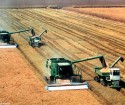How You Can Grow Your Career as a Agricultural Sciences Teacher

When you go to the grocery store, it is easy to take the wide selection of fruits and vegetables for granted. Getting this wide selection into your local store requires a lot of work from the agricultural production industry, a load of expertise from scientists that know the soil like the back of their hand and a solid understanding of trade regulations. Agriculture plays a huge role in our economy and it will always be an essential industry to not only sustain the nation, but to provide products to export. Despite the importance and job availability, the Calgary Herald reported a significant labour shortage in the farming industry, presenting a problem in sales shortages and reliance on foreign labour. This essential industry requires more expertise and labour power. Above all, it needs experts to educate the future workforce to keep this industry going strong. This is where the agricultural science teacher comes in.
Agricultural science teachers are professors that teach in postsecondary educational institutions and cover subjects related to agriculture. A few of their responsibilities include: instructing a classroom full of students on courses related to agriculture and writing scholarly articles on the field to provide additional research to the field with your own findings.
What are the perks of the job?
Professors can generally enjoy flexible hours and a fulfilling engagement with the future workforce. If you are particularly passionate about the agricultural sciences, the perks of this career choice are many. However, it doesn’t hurt that professors can generally receive an average salary of $89,895 (which is well over the Canadian national average salary of $51,000, according to Workopolis). It is also a career with a higher demand than most careers since there is a shortage of labour and expertise in the industry.
What are some of the setbacks?
The most notable setbacks associated with this career path can be the educational requirements which may present a barrier to some. Professors generally require a Master’s degree on top of a Bachelor’s degree and a standard high school education. The workload can also be excessive as professors have to grade many papers, set up tests and prepare courses.
How can I grow with this career?
Like with many professor careers, agricultural science teachers can grow to become the heads of their department as well as grow into a well-respected lecturer within the community. Professors can also become non-fiction writers that specialize in the field of their expertise. There are a few ways to grow within the role and expand it as well.
That’s all great, but could I be hired for other careers?
Of course! Having an expertise in agricultural sciences can land you a decent career within the agricultural field, including work as a farm manager, a researcher or research assistant for agriculture, a soil scientist or practice other forms of geology with additional training, plant breeder or geneticist, etc. There are many options to choose from, as long as they hold some form of knowledge surrounding the growth of crops and science of agriculture.
Reference:
Bureau of Labor Statistics, “Occupational Employment Statistics: Agricultural Sciences Teachers, Postsecondary”: https://www.bls.gov/oes/2017/may/oes251041.htm
MyPlan.com, “Agricultural Sciences Teachers, Postsecondary”: https://www.myplan.com/careers/agricultural-sciences-teachers-postsecondary/summary-25-1041.00.html
PayScale.com, “Average Professor, Postsecondary / Higher Education Salary”:
https://www.payscale.com/research/CA/Job=Professor%2C_Postsecondary_%2F_Higher_Education/Salary





Leave a comment!